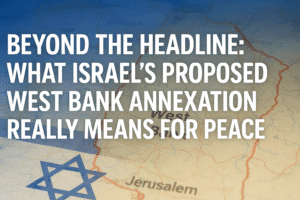Beyond the Headline: What Israel’s Proposed West Bank Annexation Really Means for Peace
Israeli far-right Finance Minister Bezalel Smotrich has declared a plan to annex 82% of the occupied West Bank, stating its explicit goal is to prevent a Palestinian state forever. The proposal operates on the principle of claiming “maximum land with minimum Arab population,” effectively incorporating settlements while leaving Palestinian residents under a separate governance system. This announcement is a preemptive strike against upcoming moves by several Western nations to recognize Palestinian statehood at the UN.
The plan aligns with the approved E1 settlement project, which would sever the West Bank in two, rendering a contiguous Palestinian state non-viable. Such annexation is widely considered illegal under international law, directly contradicting rulings from the International Court of Justice. While not yet official government policy, the declaration signals a radical shift in the political landscape, challenging the very foundation of the two-state solution and risking a permanent, unequal one-state reality.

Beyond the Headline: What Israel’s Proposed West Bank Annexation Really Means for Peace
The statement from an Israeli minister was stark, unambiguous, and sent immediate ripples across the international community. Bezalel Smotrich, Israel’s far-right Finance Minister, declared a plan to formally annex 82% of the occupied West Bank, explicitly stating its purpose: to ensure “there will never, and can never be, a Palestinian state.”
This isn’t just political posturing; it’s a direct challenge to the foundational principle of a two-state solution and a dramatic escalation that could redefine the future of the region. To understand its true significance, we must look beyond the headline and into the strategy, the timing, and the profound consequences.
The Core of the Proposal: “Maximum Land, Minimum Arabs”
Smotrich’s plan, presented at a press conference in Jerusalem, operates on a chillingly clear principle: “the maximum land with a minimum Arab population.” The proposed annexation would see Israel apply its sovereignty over the vast majority of the West Bank, including all existing settlements and the crucial Jordan Valley.
The Palestinians living in these areas would not be granted Israeli citizenship. Instead, Smotrich suggested their affairs would be managed by a weakened Palestinian Authority or, eventually, replaced by undefined “regional civilian management alternatives.” This model—claiming land without its people—has drawn comparisons to apartheid-era policies by human rights groups and echoes a long-standing critique of the occupation.
A Preemptive Strike Against International Recognition
The timing of this announcement is no accident. Smotrich himself called it a “preventative step” against a coordinated diplomatic move. In the coming weeks, during the UN General Assembly, several major Western nations—including Belgium, France, the UK, Canada, and Australia—are reportedly planning to formally recognize Palestinian statehood. This would bring the total number of recognizing countries to over 150.
By preemptively declaring annexation, Smotrich and his allies aim to create a irreversible fact on the ground, attempting to render any diplomatic recognition meaningless by claiming the very territory a future state would require.
The Legal and Strategic Backdrop: E1 and the Death of a Contiguous State
This rhetoric aligns with recent aggressive actions. Last month, Israel approved the controversial “E1” settlement project. This isn’t just another housing unit expansion; it’s a strategic masterstroke that would effectively bisect the West Bank.
By building in the E1 corridor, Israel would sever the connection between the northern Palestinian cities (like Ramallah and Nablus) and the southern ones (like Bethlehem and Hebron). It would also fully isolate East Jerusalem, the presumed future capital of Palestine, from the rest of the West Bank. The E1 plan, combined with annexation, doesn’t just shrink a potential Palestinian state; it pulverizes it into disconnected, non-viable cantons, completely surrounded by Israeli territory.
This flies directly in the face of international law. The United Nations, the International Court of Justice (ICJ), and most of the world consider all Israeli settlements in the occupied territories illegal. In a landmark opinion just last July, the ICJ called for the evacuation of all settlements and declared the occupation itself illegal. Smotrich’s plan is a direct rejection of this global legal consensus.
The Human and Political Reality Check
While Smotrich’s words are inflammatory, it’s crucial to assess their immediate reality. As Finance Minister, he does not set foreign policy unilaterally. The ultimate decision rests with Prime Minister Benjamin Netanyahu and his war cabinet, who must weigh this radical move against intense international pressure, including from the United States.
However, Smotrich’s influence is significant. His ultra-nationalist faction is a key pillar of Netanyahu’s governing coalition, giving him leverage to push the government’s Overton window ever further to the right. Even if full annexation isn’t implemented tomorrow, the declaration itself serves to normalize the idea and continues the slow, steady process of de facto annexation that has been underway for decades through settlement expansion.
The Inescapable Conclusion
Bezalel Smotrich’s announcement is more than a threat; it is a candid admission of a long-term goal. It moves the conflict from a dispute over borders to a fundamental clash over whether Palestinian self-determination in any meaningful form can exist at all.
The choice presented is increasingly stark: a single state where one group controls all the land and security while millions of others live without basic rights, or a violent, permanent struggle without end. By openly advocating for a one-state reality without equal rights, this proposal doesn’t just threaten peace—it challenges the very principles of democracy and international order, forcing the world to confront what the future of Israel and Palestine will truly be.
You must be logged in to post a comment.